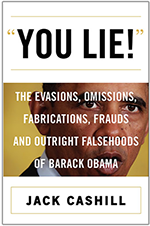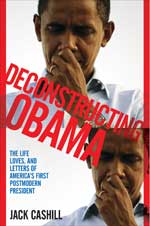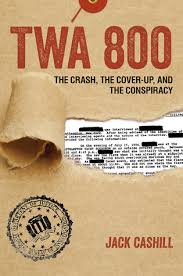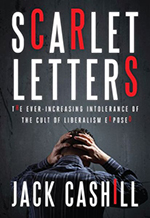When Lying About Secret Meetings Was OK
_____
Order Jack Cashill's latest book, TWA 800: The Crash, the Cover-Up, and the Conspiracy
______
Order Jack Cashill's book,
Scarlet Letters
___
Get your copy of Jack Cashill's book, "You Lie!"

___
Get your copy of Deconstructing Obama

___
Jack Cashill's book:
Hoodwinked: How Intellectual Hucksters have Hijacked American Culture
© Jack Cashill
WND.com- February 15, 2017
If you do not remember when American officials met secretly with an enemy—in this case, Iran--and lied about the meetings, you’re in good company.
The story the media eventually told, the New York Times conceded after the fact, “was largely manufactured for the purpose for (sic) selling the deal.” http://nyti.ms/2lgZqAO
Chief manufacturer was Obama aide Ben Rhodes, brother of CBS News honcho David Rhodes.
“The average reporter we talk to is 27 years old,” Rhodes told the Times, “and their only reporting experience consists of being around political campaigns. That’s a sea change. They literally know nothing.”
Rhodes’s assistant Ned Price laughingly added that he fed the manufactured narrative to the media, “and the next thing I know, lots of these guys are in the dot-com publishing space, and have huge Twitter followings, and they’ll be putting this message out on their own.”
In February 2013, Fox News Chief Washington Correspondent James Rosen, the same Rosen who had been singled out for NSA surveillance, wasn’t drinking the Kool-Aid.
Rosen asked then State Department spokesperson Victoria Nuland about reports of "direct, secret bilateral talks with Iran."
Answered Nuland, "With regard to the kind of thing you're talking about on a government-to-government level: no.” Nuland was lying.
What made this unique among the hundreds of other White House lies was that the administration eventually owned up to it, at least sort of.
In December 2013, Rosen returned to the State Department briefing room to confront current spokesperson Jen Psaki about reports that senior American officials had been engaging in a series of meetings with equally senior Iranian officials.
Asked Rosen, "The question today is a simply one: when the briefer was asked about those talks and flatly denied them, that was untrue, correct?" http://politi.co/1bObYUe
After some awkward equivocating by Psaki, Rosen asked, if it were "the policy of the State Department to lie” to preserve the secrecy of certain negotiations.
"There are times when diplomacy needs privacy in order to progress,” Psaki conceded. “This is a good example of that."
In fact, the reports that Rosen cited were accurate. For the previous two years, American officials had been meeting with their Iranian counterparts in Oman. They met to conclude an agreement on Iran’s nuclear policy.
“The lie matters less than the investment in the talks themselves,” argued Major Garrett in the National Journal. Garrett made the case that Obama blocked sanctions so that these secret negotiations could proceed unimpeded.
Garrett did not account, however, for Obama’s quick embrace of sanctions once he realized Romney’s tough talk was eroding his donor base. Ever hopeful, Garrett or his editors titled his article, “The Obama administration's useful lie about Iran talks.” http://bit.ly/1g08PSC
Israeli Prime Minister Benjamin Netanyahu, for one, did not think the talks were “useful” to Israel at all. "What was concluded in Geneva last night is not a historic agreement, it's a historic mistake,” said Netanyahu in late November 2013.
The deal, he argued, has Iran "taking only cosmetic steps which it could reverse easily within a few weeks, and in return, sanctions that took years to put in place are going to be eased."
The Iranian nuke deal proved useful to Obama at least in the short haul. He took the occasion of his 2014 State of the Union speech to boast of his administration’s diplomacy, which, he claimed, “halted the progress of Iran's nuclear program -- and rolled back parts of that program -- for the very first time in a decade.”
He attributed this success in no small part to “the sanctions that we put in place,” the same congressionally driven sanctions that he had earlier attempted to sabotage.
To clarify his own position going forward, he insisted, “If this Congress sends me a new sanctions bill now that threatens to derail these talks, I will veto it.” http://wapo.st/LlZIR0
In an ironic spin of the wheel, Iran promptly accused Obama of lying about how the tentative deal was reached. Said foreign ministry spokeswoman Marzieh Afkham,
"The delusion of sanctions having an effect on Iran's motivation for nuclear negotiations is based on a false narration of history.”
Showing the world just how reliable a negotiating partner Iran would be, Afkham insisted, "America considers preventing Iran from obtaining a nuclear weapon to be its biggest achievement, but it is wrong since Iran has never sought to obtain a nuclear weapon and will never do so in future." http://yhoo.it/1giujK4 Of course, not.
“The key to phase one of the Iran deal is for the White House to tell no lies to itself now about Iran's actions,” wrote an insufficiently jaded Garrett in the National Journal. “It's equally important the administration not lie to itself about the value of its cloak-and-dagger diplomacy.”
This did not happen. Going forward, both Iran and the Obama administration had every incentive to lie: Iran to protect its nuclear program, Obama to protect his legacy.
Unfortunately, both too had a well-documented history of doing just that. Caroline Glick made this case in the summary of her mischievously titled article, “Column One: Obamacare victims and Israel.”
If Congress does not call Obama on his lies, she worried out loud, “Israel becomes the foreign corollary to the Americans whose health insurance Obama canceled.” Touché!

Jack Cashill’s newest book, TWA 800: The Crash, the Cover up, the Conspiracy can now be ordered at Amazon.



